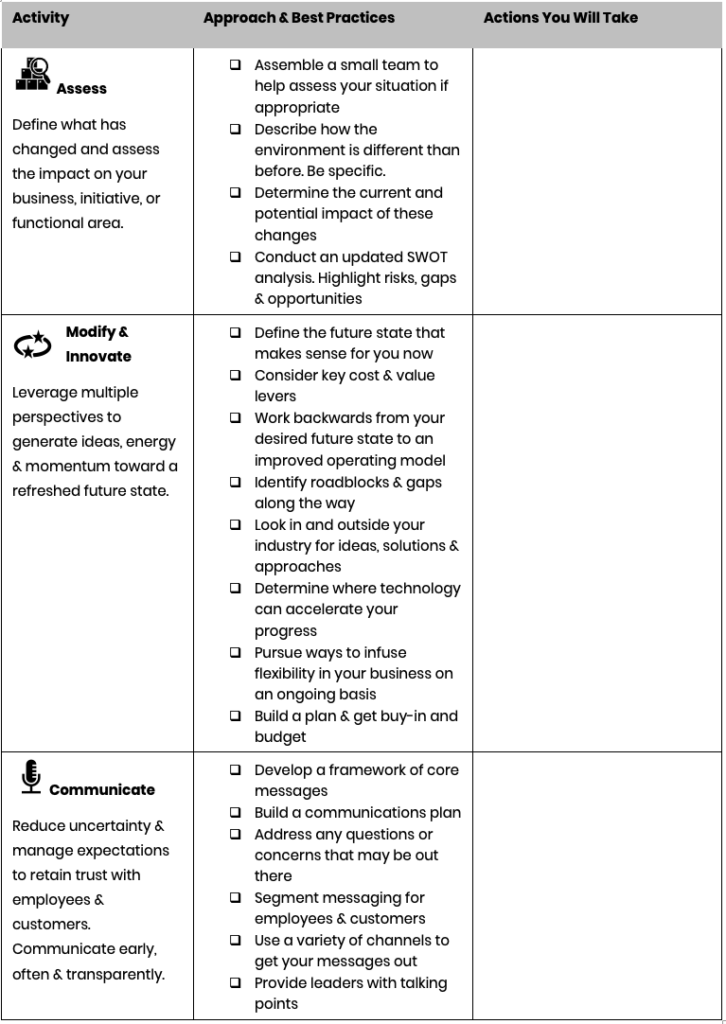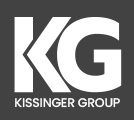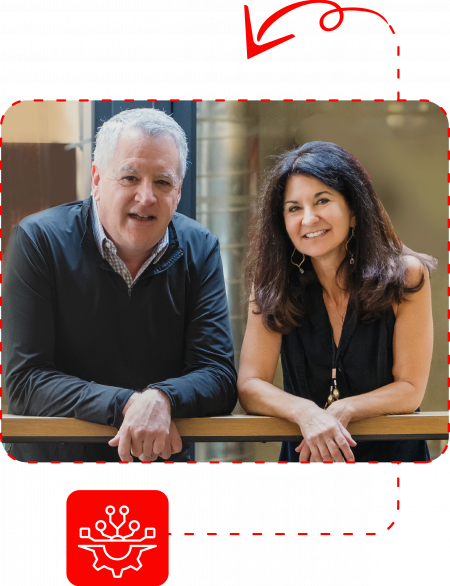Darwin famously noted that survival isn’t about being the strongest or the smartest, but about being the most adaptable to change. More than 150 years later, his insight captures the essence of business today: adaptability is key to thriving and staying competitive.
Great leaders understand this and cultivate the competencies to anticipate shifts, respond quickly, and lead with confidence. But these skills don’t come naturally to most people—they require an intentional effort and willingness to step out of your comfort zone. Having a deliberate approach to adaptability is helpful.
Here is a simple three-part model to help you and your team navigate uncertainty with clarity and speed, so you’re always prepared for what’s next.
- Assess
The first step in adapting to any change is a thorough situational assessment. This isn’t just about identifying what has changed but understanding the implications for your business, your customers, and the broader environment. Leaders should evaluate both immediate and long-term impacts and craft strategies that address current challenges while positioning the organization for future opportunities.
Assessment in Action:
Coca-Cola provides an excellent example of a company that stepped back to reassess changes in the environment. In response to declining sales of sugary drinks and increasing consumer demand for healthier options, the company reassessed its product portfolio. Recognizing an important shift in consumer preferences, the beverage giant expanded its offerings to include more water, tea, and low-calorie beverages, allowing the business to maintain its market leadership while aligning with evolving consumer trends.
- Modify & Innovate
Once the landscape has been assessed, the next step is to adapt by modifying existing strategies, innovating where necessary. This might involve tweaking your products, services, or processes to better align with the new environment as Coca-Cola did in the above example or a more complete overhaul. By fostering a culture that encourages creative problem-solving and experimentation, organizations can tap into innovation to turn challenges into opportunities.
Modification and Innovation in Action:
LEGO is a prime example of a company that modified its approach to keep pace with a changing market. Faced with declining sales, LEGO reimagined its product offerings, focusing on digital and educational experiences that appealed to modern children. By leveraging technology and embracing new ideas, LEGO not only survived but thrived, transforming from a traditional toy company into a digital entertainment powerhouse.
- Communicate
Effective communication is the glue that binds all the pieces together. Use transparent and consistent communication to keep all stakeholders informed and engaged throughout the change process and ensure that everyone understands the rationale behind decisions, the steps being taken, and the expected outcomes.
Communication in Action:
Airbnb’s response to the travel industry’s collapse during the early stages of the pandemic exemplifies effective communication. When the crisis hit, CEO Brian Chesky addressed employees and hosts with an open letter, transparently detailing the challenges the company faced, the difficult decisions required (including layoffs), and the strategic path forward. This candid communication helped maintain trust and engagement during a period of immense uncertainty.
Putting It All Together
Use the simple worksheet below to move quickly and thoughtfully through new circumstances.

By integrating this three-part model into your operational approach, you can create a culture that is not only responsive to change but also proactive in driving it. Whether you’re facing economic shifts, technological advancements, or changes in consumer behavior, rapid adaptability will help you stay resilient and capitalize on new opportunities.
Are you ready to enhance your organization’s adaptability and innovation? Assess your situation, get ready modify and innovate, and never underestimate the power of communication in guiding your team through change.
———————————
Kissinger Group is a boutique consulting firm that empowers organizations to lead transformative change, delivering lasting value and impact.

Meet The Author
Sondra Kiss is the co-founder and managing director of Kissinger Group.


